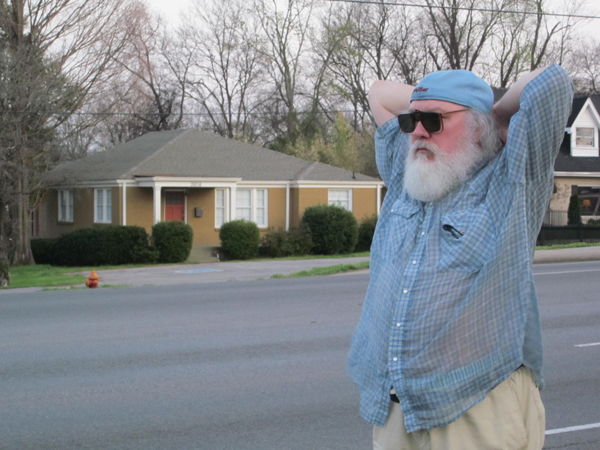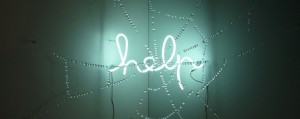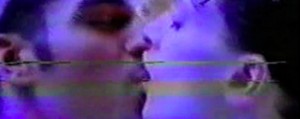In pop music, timing is everything. Whether it’s Elvis Presley and his diabolical pelvis or The Beatles and their outrageous hairstyles, there is a unique cultural context, of which one is both product and propagator, that makes a musician a cultural icon. Then there are those artists, so unique and so ahead of their time that they are condemned to living and working in relative obscurity, until the day the world catches up. One such example is US lo-fi artist R Stevie Moore. At 60-years-old he has been producing music for over 40 years, with a catalogue of over 400 releases that is only just beginning to generate interest beyond a small circle of cult followers –psych-pop performer Ariel Pink among them.
Now, Moore is finally reaping the rewards of his dogged perseverance. He’s just finished his second European tour ever, graced the cover of the prestigious Wire magazine and features in an as-yet-to-be-released documentary on the eccentric artist’s life. All this and Moore still has time for Tim Burgess-curated compilation Lo Fi High Fives out on the aforementioned Brit pop artist’s label O Genesis Recordings, August 6. You’d think that with the world changing at such a rate that someone of Moore’s vintage would get lost somewhere along the way, from his 60s beginnings to these world wide webbed days gone mad, but it seems this is the time R Stevie Moore and his immense catalogue of umpteen vinyl records, cassettes, compact discs and, now, digital downloads have been waiting for. Sitting across a coffee table between sound checks in London, Moore gulps a glass of wine and struggles to connect to the wi-fi as he and band member Jr Thomason extrapolate on his life, his recordings and why he was made for the information age.

aqnb: In the late 60s, early 80s you were really paying attention to pop music weren’t you?
RSM: Yeah, and I always kind of have. I gave up in the 80s when Madonna and Michael Jackson destroyed rock n roll and it all became style over content. Everything was all dance floor and, of course, that’s what we have now with Simon Cowell; that’s all music seems to be now and the rest seems to be borderline underground. Everybody is trying to get their 15-minutes of fame and the shock factor comes into it. Did you see the new Flaming Lips and Erykah Badu?
aqnb: [shakes head]
RSM: Okay. It’s just something that gets peoples’ interest. Controversy and sex, music and video, trying to get attention because everything’s been pretty much done.
aqnb: Do you think maybe post-punk, when it turned toward New Wave or the New Romantic, killed pop?
RSM: I don’t know. I love post punk, the minimalism of it.
aqnb: But when you get up to Human League…
RSM: Yeah well, that dabbled in bubble gum pop but there’s great Human League too, besides ‘Don’t You Want Me Baby’ and that’s a great song too, let’s face it.
Nirvana was a huge influence on me because that came right about when we needed to wipe all the crap away and get back. They were so organic. I feel I’m a very organic artist.

aqnb: How old were you at that stage?
RSM: How old was I? About 40…
Jr Thomason: You were 40 when Never Mind came out. In fact you were 39.
RSM: Who is this guy? This is my guitar player, Jr. He’s not feeling well.
aqnb: Who’s the film director?
JT: Oh, Jon Demiglio, he’s my good friend.
aqnb: And that’s how the band got started?
RSM: Yeah, a film student was interested in doing a documentary on me. We met and he said, ‘how do you feel about going on tour?’ I said ‘you’re crazy. I stay home and I don’t go out much at all. I could never go out on a tour. I could do one show.’ But he introduced me to his friends and they became my band. I love the music and I love them for playing. It just all fell into place. This was last year beginning of 2011.
aqnb: So do you have another band, Jr?
JT: Yeah, the band is called Tropical Ooze. It’s just a kind of art pop group; rock thing. My guitar sounds the way it sounds and we play in kind of the same way, so it fits really well with Stevie’s thing. It’s easy because you just go to YouTube, learn the song off there and practice and we’re ready to play. But sometimes the tape speeds are fucked up and we’ll learn in the wrong key and he’d be like, ‘no, it’s in D’.
aqnb: There are a lot of samey-sounding bands playing around right now.
JT: Yeah, everywhere. Even scenes are totally dead. I bet there was great music in Seattle in ’86, ’87, ’89, ‘90 when it starts to break, ‘91 ‘92 ‘93.
But now indie rock, with all the blogs and commentary and the way that people can broadcast them selves from everywhere… it’s supposed to be this great revolution that equalises all the great art, that makes it available, but it also destroys scenes. Because if you can’t play in obscurity for five or six years in your home town, where everybody plays and fucks each other… all those relationships and developments that happen in scenes… if you can’t have that then what is the fucking point of Brooklyn being Brooklyn?
aqnb: Stevie, you’re meant to be recording with the band in Cologne soon, do you think it will be more of a collaborative effort?
RSM: Perhaps, it’s hard to say. I’m going to really go over the edge though with experimentation. Our live show is pretty much a hard rock band doing songs; loud guitars and 70s style. It’s not really metal, it’s not punk but it’s hard rock. But my records go all over the map stylistically. I would love to bring that on stage more but we just don’t have a chance to, it’s keeping it simple. With this new record I hope to be more cut and paste, a lot of throwing things on the wall and see if they stick. I want it to be a chaotic circus record. It’s not going to sound like the band.
I haven’t had a chance to do that in a while, except Pro Tools cut and paste. But that’s kind of cheating making music ‘cause you’re just electronically manipulating how you’re hearing. I’m not really into taking samples from the hit songs, from the big bands, like hip hoppers do. Even that’s kind of old school, to steal from other records.
But I have one of these things [pointing to the Dictaphone] I’m just always recording and everything I record is relative to being used. It’s not just to create song demos that can be improved in a huge studio for hi-fi.
aqnb: What are your thoughts on being deemed the ‘Grandfather of Lo-Fi’?
RSM: I’m sick of the nametag of ‘lo-fi’; like I’m the ‘King of Lo Fi’. I don’t see what lo fi has to do with music making. Why does everything have to be polished hi fi? I grew up with Beatles bootlegs. I love that stuff. Everybody that had a rock n roll hero didn’t’ differentiate between their official records and live shows, and badly recorded song-writing demos; that stuff’s gold. It’s the same with movies. If you have a favourite actor, you want to get all the photos and recordings of them doing interviews… I think it’s so stupid worrying about it being lo fi. I’m trying to make it ‘DIY-fi’. I’m calling it DIY-fi; get rid of the lo-fi or hi-fi.
aqnb: What about your association with outsider artists?
RSM: I’m lumped in with the so called outsider artists genre; with Daniel Johnston and these people. I admire a lot of them but then again we’re in two totally different leagues because they’re really lo fi and they don’t really get into musicality and I do have this gift of song writing. Brian Wilson Pet Sounds, that kind of stuff, is going through my head, as is bad punk rock because I love all styles. I throw them all together and you’re not going to hear that with most of the outsider artists.
My records are like radio shows or mixtapes because I have a short attention span and I like everything. I don’t want to just be one artist. All of these fucking bands that come out, even if they have an interesting idea, the entire album that they come out with has the same interesting idea. There’s just no jumping around. Some people like that kind of stuff, that two-dimensional music. I feel like I’m three or four dimensions because I’m just jumping around.
aqnb: Is that short attention span why you’ve taken to the internet so well?
RSM: I’m not big on Twitter; that confuses me, the appeal of that. Tim Burgess is working on Twitter and that’s great, he utilises it to be interactive with his peeps and also it offers quick stabs of raising awareness. But I love Facebook. I understand that it’s a total time-suck and people hate it, totally, but it is what it is.
It’s a social network. I use it as a tool to raise awareness. When I get lost on Facebook, I’m posting and people say, ‘stop posting so much’. Then I say, ‘there’s the exit, get out of here’. I am posting too much because that’s just what I’m doing. I feel like it’s performance art, almost; to connect with people on the internet.
aqnb: That’s an interesting point though. When is a lot too much? When something is easily accessible, then its value also goes down.
RSM: True, everything is so disposable and my heroes are full of endurable qualities, like jazz and a whole century of music and art. But you can’t escape it; we live in this era. Of course, every kid is doing it and they don’t know how to speak or draw but what are you going to do about it? You can’t change that.
R Stevie Moore’s Lo Fi High Fives is out on O Genesis Records August 6, 2012.
















